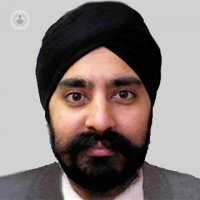Holistic eye care: The importance of seeing a general ophthalmologist
Autore:It’s very wise to have a holistic ophthalmology assessment because it’s one of the most important defences against several eye conditions. Having your eyes looked at yearly is as important as having your teeth looked at each year.
Learn from Dr Jasvir Grewal (a consultant ophthalmologist who provides general and specialised ophthalmology services) about how you can greatly benefit from a holistic approach to your eye check-ups.

How important is visiting an ophthalmologist?
Some people wait until they have issues with their sight before getting a check-up, but there are numerous conditions that you can have without having symptoms. With an ophthalmologist, the check-up is more comprehensive than at an optician’s office. It’s advisable so you can stop issues before they become a major problem e.g.
- Early cataracts
- Early glaucoma
- Early conditions affecting the retina
- Early oculoplastic conditions (e.g. eyelid problems)
Which eye specialists are the best for eye assessments?
If you’re searching for truly holistic eye care that isn’t driven by the specific treatments that a sub-specialist can offer, a general ophthalmologist could very likely be the best specialist for you. Other general ophthalmologists and I are very happy to examine every aspect of your eye health and create an individualised treatment plan without bias. We make sure all angles are covered because you use your eyes in different ways. For example, think about how your eye is linked to the brain. This is why I thoroughly believe in looking at eye care on a holistic level.
In short, you really want someone skilled in all aspects of ophthalmology to preform comprehensive eye check-ups.
Aren't all ophthalmologists equally experts on the eye?
It’s very difficult to find a specialist who still does general ophthalmology. In many cases, people search for a specific type of ophthalmologist who practices in a very specific field (e.g. the retina or the front of the eye).
I like to be referred to as an eye doctor rather than an eye surgeon because I’m not led by surgical treatments. I can look at eye care in medical, non-medical and surgical ways. When patients visit me, I take a very comprehensive look at the entire eye, which is rare. While all ophthalmologists are experts, the vast majority have a sub-speciality. In some cases, a sub-specialist might have not have done general ophthalmology for a very long time and are more suited to treating issues within their sub-speciality rather than holistically evaluating your eye health.
What's the benefit of a holistic approach?
A general ophthalmologist looks at a patient’s entire eye and takes into account how they use their eyes in their day-to-day lives. If a surgeon has looked at the same part of the eye (compartmentalised), their experience of the rest of the eye can be lessened.
Examining the eye holistically allows me to direct eye care to what is most important to you, rather than limiting it to a few chosen treatments. I look at all aspects of the eye and then generally link the state of your eye to your lifestyle before suggesting any specific treatment.
Furthermore, an optician may see a cataract but there may also be other conditions that they have missed because a cataract was the most obvious finding. You can feel reassured that I will not be led by whatever eye issue you’ve been referred for only, but I will also look into your eye as an independent opinion then discuss your need and what is important to you before suggesting treatment.
What type of treatment will be offered?
It’s important to understand that sometimes, no specific treatment is the best course of action e.g. if you’re feeling eye strain in your day to day work life, a few lifestyle tweaks and how you are using your eyes in your day to day work can be all that’s required (rather than expensive treatments).
As a general practitioner who examines their patients’ eyes in a holistic way, I link patients’ physical, social and psychological needs to their eye assessment. By doing so, patients can leave my clinic knowing that all aspects of their eye health have been fully evaluated.


